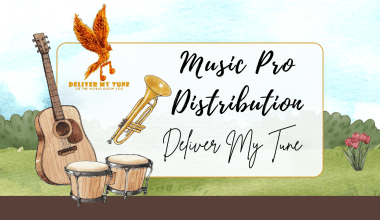The entertainment industry offers countless opportunities for musicians to showcase their work, and one of the most lucrative and impactful avenues is submitting music for TV and films. Getting your music featured in a television show or movie can significantly boost your career, providing exposure to a broad audience and potential financial benefits. In this blog, we will explore the detailed process of How to Submit Music for TV or Films, providing valuable tips and resources to help you navigate this exciting aspect of the music industry.
Understanding the Basics
Before diving into the specifics of how to submit music for TV or films, it’s essential to understand why this avenue is so beneficial for musicians.
Why Submit Music for TV or Films?
- Exposure: Getting your music featured in a TV show or film can introduce your work to millions of viewers, significantly increasing your fan base.
- Financial Gain: Music placements can provide substantial income through upfront fees, royalties, and residuals.
- Career Opportunities: A successful placement can lead to more opportunities in the industry, including additional placements and collaborations with other artists and producers.
- Portfolio Building: Having your music featured in well-known productions enhances your portfolio and credibility within the industry.
Preparing Your Music for Submission
Quality Matters
The first step in the submission process is ensuring that your music is of high quality. This means professional production, mixing, and mastering. Submissions with poor sound quality are unlikely to be considered, regardless of the composition’s merit.
Genre and Mood
Consider the type of TV shows or films you are targeting. Different genres and moods are suitable for different types of productions. Research the kinds of music typically used in the shows or films you are interested in to ensure your submissions are relevant.
Metadata
Ensure your music files are properly tagged with accurate metadata. This includes the title, artist name, contact information, and any relevant credits. Proper metadata helps music supervisors and producers identify and reach out to you if they are interested in your work.
Instrumentals and Stems
Many TV and film productions prefer instrumental versions of songs. Additionally, providing stems (separate audio files for different elements of the track, such as vocals, drums, and bass) can make your music more versatile and easier to edit for specific scenes.
How to Submit Music for TV or Films
Research Potential Opportunities
Start by identifying the right opportunities for your music. This involves researching TV shows, films, production companies, and music supervisors who might be interested in your style of music.
Music Libraries
Music libraries are databases where composers and musicians can upload their music for licensing opportunities. These libraries are frequently used by TV and film producers looking for music. Some popular music libraries include:
- Audio Network
- Pond5
- Epidemic Sound
- Artlist
- Musicbed
Direct Submission to Music Supervisors
Music supervisors are responsible for selecting and licensing music for TV shows and films. Building relationships with music supervisors can be beneficial. Here are some steps to submit your music directly to them:
- Find the Right Contacts: Identify the music supervisors working on the TV shows or films you are targeting. This information can often be found through industry directories, LinkedIn, or the credits of the show or film.
- Craft a Professional Email: Write a concise and professional email introducing yourself and your music. Include links to your best tracks that are relevant to their projects.
- Follow Up: If you don’t receive a response, it’s acceptable to send a polite follow-up email after a few weeks. However, avoid being overly persistent.
Networking
Networking is crucial in the music industry. Attend industry events, music conferences, and film festivals to meet producers, directors, and music supervisors. Building personal relationships can open doors to submission opportunities.
Maintain a professional online presence through your website, social media profiles, and music streaming platforms. Ensure your contact information is easily accessible, and your music is well-represented online. Many opportunities can come from having a strong online presence where industry professionals can discover your work.
Legal Considerations
Copyright and Licensing
Ensure that your music is properly copyrighted before submitting it for TV or film placements. This protects your work from being used without your permission and ensures you receive appropriate compensation.
Publishing and Royalties
Understand the different types of royalties associated with music placements, including performance royalties, mechanical royalties, and sync fees. Registering your music with a performing rights organization (PRO) like ASCAP, BMI, or SESAC ensures you receive royalties when your music is played.
Contracts
When you secure a placement, carefully review any contracts or agreements. It may be beneficial to consult with a music attorney to ensure you understand the terms and protect your rights.
Creating a Submission Package
A well-prepared submission package increases your chances of getting noticed by music supervisors and producers. Here are the essential components of a successful submission package:
Music Tracks
Include high-quality WAV or MP3 files of your best tracks. Make sure the tracks are fully mastered and ready for use in a TV show or film.
Biography
Provide a brief biography that highlights your musical background, achievements, and any previous placements or notable projects.
Contact Information
Ensure your contact information is clearly visible in your submission package. Include your email address, phone number, and any relevant social media handles.
Licensing Information
Include information about the licensing terms for your music. Specify whether your tracks are available for exclusive or non-exclusive licensing.
Tips for Success
Be Selective
Submit only your best work. Quality is more important than quantity. Tailor your submissions to fit the specific needs of the TV show or film.
Be Professional
Maintain a professional demeanor in all your communications. Music supervisors and producers prefer to work with reliable and professional artists.
Stay Persistent
The process of submitting music for TV or films can be competitive and may require patience. Stay persistent and continue to improve your craft and submission strategies.
Keep Learning
Stay informed about industry trends and changes in the submission process. Join industry groups, subscribe to newsletters, and participate in workshops to keep your knowledge up-to-date.
Resources for Musicians
Online Courses and Workshops
Investing in online courses and workshops can provide valuable insights into the music submission process. Platforms like Coursera, Udemy, and MasterClass offer courses on music production, licensing, and industry navigation.
Books
Reading books written by industry professionals can provide in-depth knowledge and practical advice. Some recommended titles include:
- “This Business of Music: The Definitive Guide to the Music Industry” by M. William Krasilovsky and Sidney Shemel
- “Music, Money, and Success: The Insider’s Guide to Making Money in the Music Business” by Jeffrey Brabec and Todd Brabec
- “All You Need to Know About the Music Business” by Donald S. Passman
Industry Organizations
Joining industry organizations can provide networking opportunities, resources, and support. Some notable organizations include:
- The Recording Academy (GRAMMYs)
- The American Society of Composers, Authors and Publishers (ASCAP)
- Broadcast Music, Inc. (BMI)
- Society of Composers and Lyricists (SCL)
Online Communities
Participate in online communities and forums where musicians share experiences and advice about submitting music for TV or films. Websites like Reddit, Gearslutz, and SoundBetter have active communities of music professionals.
Conclusion
Submitting music for TV or films is a valuable and rewarding opportunity for musicians. By understanding the submission process, preparing high-quality music, and leveraging the right resources, you can increase your chances of securing placements in television shows and movies. Stay persistent, professional, and proactive in your efforts, and you will find success in getting your music featured on the big screen.
By following the advice and strategies outlined in this blog, you can navigate the competitive landscape of music submission and achieve your goals of getting your music featured in TV shows and films. Good luck!
For further reading, explore these related articles:
- What is YouTube Content ID?
- Deliver My Tune’s Exciting New Services!
- Know the Ways to Get the Music Sync Licensing
- What is Performance Royalty?
For additional resources on music marketing and distribution, visit Deliver My Tune.






